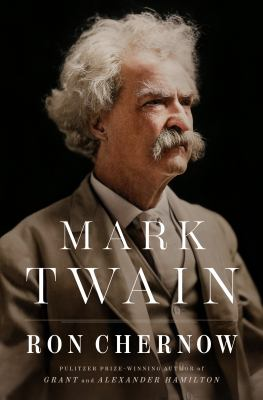Mark Twain (born Samuel Langhorn Clemens) died 115 years ago, on April 21, 1910. He is widely regarded as one of America’s finest authors, especially in humor and travel writing. Twain was 74 when he died, which probably surprised him in light of his early years. Born two months prematurely, he was a sickly child whose mother was always trying new health cures on him. According to Britannica Library, when she was in her 80s Twain asked his mother if she felt uneasy when he was growing up, and she asserted that she did. “Afraid I wouldn’t live?” he asked. “No,” she replied, “afraid you would.”
A new biography, Mark Twain, comes out May 25, 2025. The book has received rave reviews; not surprising as it is written by Ron Chernow, a Pulitzer Prize winner and author of Alexander Hamilton, basis for the hit musical. Another Twain connection is to the book James by Percival Everett (2024), winner of the National Book Award. Everett re-imagines The Adventures of Huckleberry Finn in his rich retelling through the eyes of Jim, an enslaved man and a minor character in Twain’s original.
John F. Kennedy Center for the Performing Arts gives out an annual Mark Twain Prize for American Humor. The prize honors an individual who has “had an impact on American society in ways similar to” Mark Twain. The recipient for 2025 is Conan O’Brien. Listed below are some of Mark Twain’s best-loved satire and humor writings.
Novels
- The Gilded Age (1873) - co-authored with Charles Dudley Warner, this is a biting satire about American society in the post-Civil War era.
- The Innocents Abroad (1881) - comedic chronicle of Twain’s five-month steamship voyage.
- A Connecticut Yankee at King Arthur’s Court (1889) - humorous time-travel story about a mechanic from Twain’s time who attempts to modernize medieval England.
- Letters from the Earth (1962) - letters from Satan to the archangels Gabriel and Michael.
Short Stories
These stories can be found in various short story collections, such as The mysterious stranger and other stories and The complete short stories, and some are available online.
- The Celebrated Jumping Frog of Calaveras County (1865) - also known as Jim Smiley and the Jumping Frog, this is probably Twain’s most famous short story. It centers upon a gambler who will bet on anything.
- The Story of the Bad Little Boy Who Didn’t Come to Grief (1865) - the title says it all. Twain wanted to contrast the child in his story to typical Sunday School stories where dire consequences occurred to the main characters.
- The Million Pound Bank Note (1893) - an impoverished traveler becomes the subject of a bet between two wealthy brothers. This story may be the basis for the movie Trading Places with Eddie Murphy and Dan Aykroyd.
- The Man that Corrupted Hadleyburg (1899) - examines the sometimes-hypocritical underbelly of human nature.
Let’s part with a quote, shall we?
“Clothes make the man. Naked people have little or no influence on society.” - Mark Twain
New at the Library
Fiction
- The Float Test by Lynn Steger Strong
- Good Dirt by Charmaine Wilkerson
- The Family Recipe by Carolyn Huynh
Nonfiction
- The ride : Paul Revere and the night that saved America by Kostya Kennedy
- Propaganda girls : the secret war of the women in the OSS by Lisa Rogak
- The prosecutor : one man's battle to bring Nazis to justice by Jack Fairweather
Children
- Giraffe’s Book is Missing a Story by DK Ryland
- What Coco Can Do by Maribeth Boelts
- This is a Moment by Micah Player

